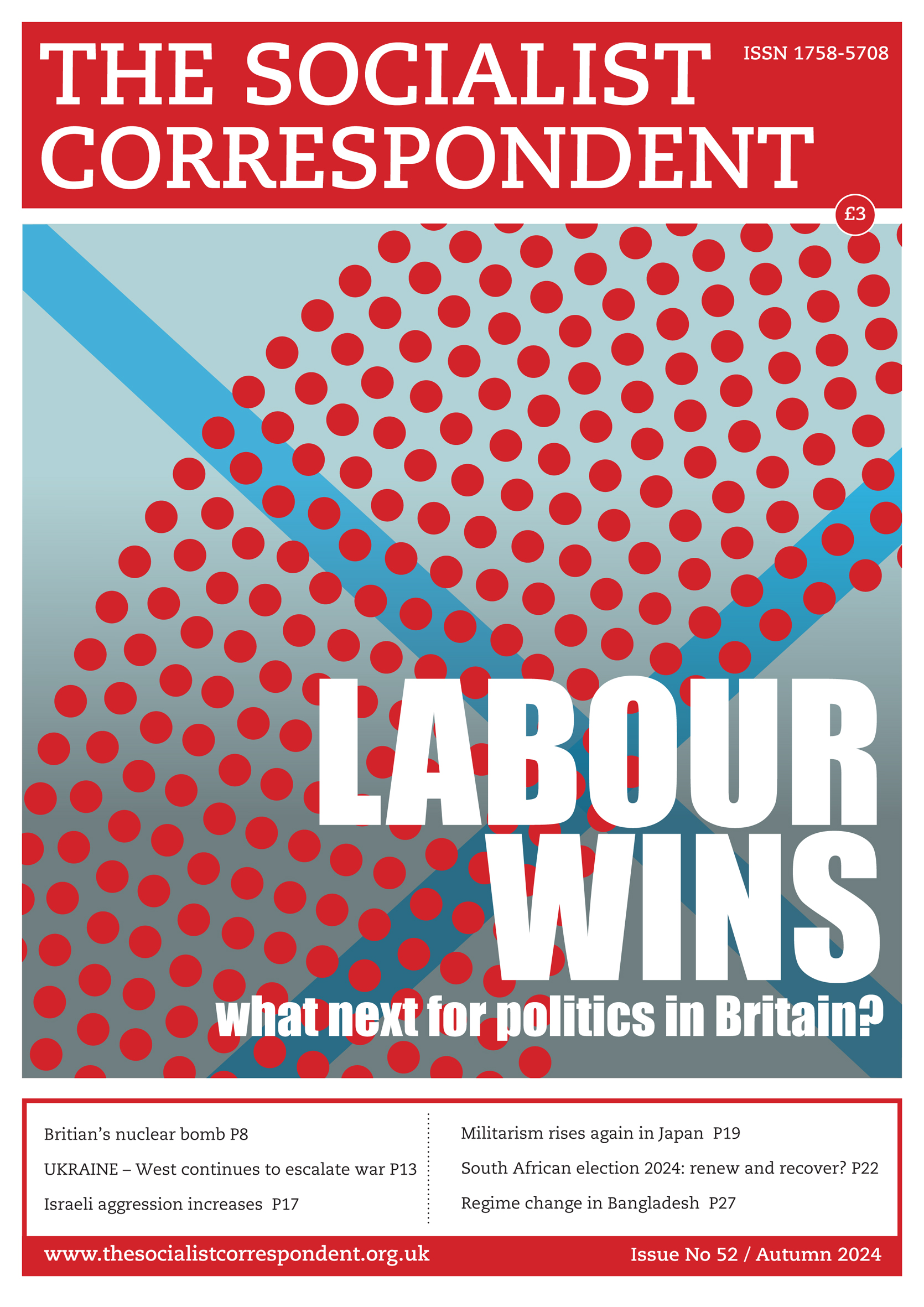Issue 52 Autumn 2024
CONTENTS: A Labour government - what next?, Frieda Park: Britain's nuclear bomb, Clare Bailey: Ukraine - West continues to escalate war, John Moore: Israeli aggression increases, Helen Christopher: Militarism rises again in Japan, Simon Korner: South African election 2024 - can the ANC renew and recover? Alex Davidson: Regime change in Bangladesh, Pat Turnbull: Chile - a bright future for capital, Dan Morgan: Spring by Sergei Antonov, Reviewed by Marianne Hitchen
At last the Conservatives have gone and Britain has a Labour government with a massive majority in terms of seats. Yet that huge majority masks an underlying fragility in the Labour vote. As Frieda Park shows in, A Labour government – what next? its victory was achieved through the collapse of the Tories and of the SNP in Scotland and the rise of Reform UK. Labour only slightly increased its vote share and indeed more people voted Labour in the two general elections when Jeremy Corbyn was leader. Voter turnout was down. This demonstrates that the electorate was not really convinced by Starmer’s offering despite Labour’s shift to the right gaining the support of the establishment.
While Labour has made some good moves since coming to power, like settling the public sector pay disputes and better policies on Gaza, much more needs to be done to enthuse the electorate and rebuild public services. If people don’t see tangible change, they will have no reason to vote Labour in the future, and promising that things will get worse - cutting winter fuel payments and cuts to services - is not the way to achieve this. Worst of all the government is committed to pursuing the war agenda of NATO.
A vital role will be played by the trade unions, community campaigners and the peace movement to pressure Labour to adopt better policies. We can already see this happening. That is the difference between having a Labour and a Tory government. People have expectations of a Labour government. The task is making the government listen to its voters.
Nuclear weapons
It should not surprise us that Labour is wholly committed to NATO, arming Ukraine and being confrontational with China. Those aspects of UK foreign policy have long had bi-partisan support from Labour as well as the Tories. In Britian’s nuclear bomb, Clare Bailey examines the history of how Britain got nuclear weapons, initially proposed by Winston Churchill and then pursued by the Labour foreign secretary Ernest Bevin.
The story is also one of post-war rivalry between Britain and the United States, but ultimately with Britain forced to play second fiddle to the US. Now Britain’s so-called independent nuclear bomb is anything but, relying entirely on the United States technically, politically and militarily.
As our world becomes more dangerous and the prospect of nuclear war comes closer, it raises urgent questions about the wisdom of spending huge sums of money on these weapons of mass destruction when the government is talking about cuts.
Flashpoints
Despite the dangers to Europe and the world, the West continues to press on with its disastrous war in Ukraine. Even with the evident failures on Ukraine’s part to make progress in the war, including its incursion into Kursk and despite the suffering on all sides, the West is determined to double down on war. It has peremptorily dismissed peace plans and calls for negotiations. On the contrary, there are increasing moves to allow Ukraine to use weapons supplied by the West to hit targets within Russia, as John Moore points out in Ukraine – West continues to escalate war. This has the potential to widen the war, making the countries who supply these weapons increasingly party to the conflict. He also describes the worrying build-up of NATO bases in Europe as the United States tries to move the responsibility for the war to European countries.
There are immediate concerns over the war in Ukraine and the expansion of Israel’s genocidal war against the Palestinians, which it is attempting to turn into a regional war; but we also need to alert people to the build-up by the West to war with China. One aspect of this is the rearmament and increasingly aggressive military posture of Japan, dealt with by Simon Korner in Militarism rises again in Japan. Imperialists in Japan have long sought to shed the constraints placed on it as a defeated nation after the Second World War and now they have been given the green light to do this by the United States, which wants Japan to be part of the military encirclement of China and of Russia in the East. However, as the only country which has experienced the use of nuclear weapons at Hiroshima and Nagasaki, there is also a strong peace movement in Japan which rejects these moves.
Peace and anti-imperialism
All these articles and others in this edition point to the pressing need for people throughout the world to reject the West’s drive to war and to argue for spending on welfare not warfare. In some countries there are strong voices against war, but that still feels relatively muted in Britian with support in some trade unions for increased arms spending and sending more weapons to Ukraine. Seeing the West’s support for Israel’s genocide in Gaza has helped lay bare the nature of the West’s interests and should lead to more questioning of why it wants to keep the war in Ukraine going. Above all we need to argue that the Labour government can make the choice to ditch spending on war in favour of spending to improve the lives of people in Britain.
Read the PDF version of Issue 52

